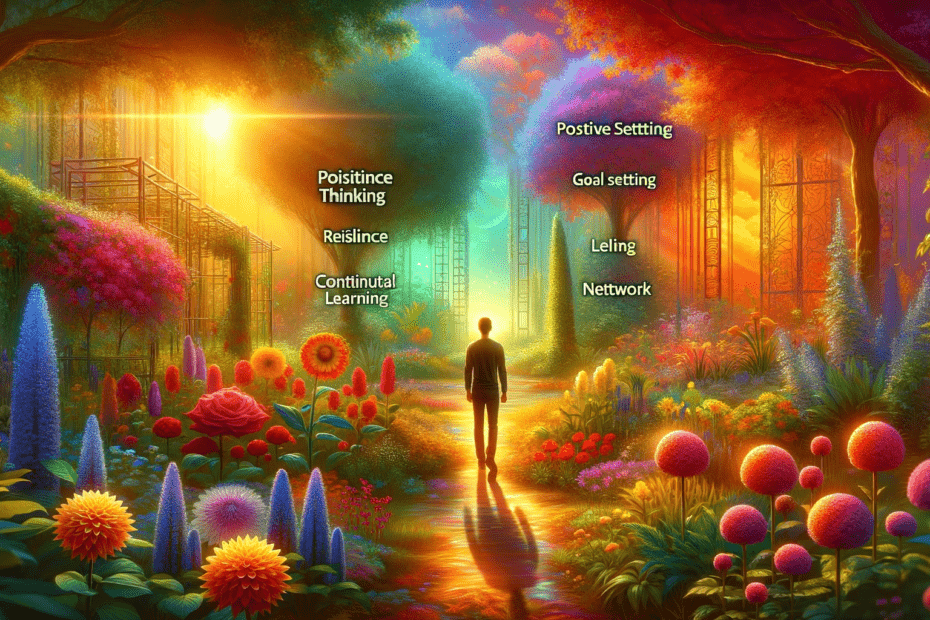Are you struggling to believe in yourself? Don't worry, you're not alone. Cultivating self-belief is a journey, but with the right strategies, you can unleash your true potential.
In this article, we will explore six powerful techniques that will help you overcome limiting beliefs, challenge negative self-talk, and set achievable goals.
By surrounding yourself with positive influences, embracing failure, and practicing self-compassion, you'll unlock a world of possibilities.
Get ready to transform your mindset and unleash your inner confidence.
Key Takeaways
- Identify and challenge limiting beliefs
- Replace negative self-talk with empowering thoughts
- Set specific, attainable goals and celebrate achievements
- Surround yourself with positive influences and supportive people
Identifying Limiting Beliefs
To effectively cultivate self-belief, it's important for you to frequently identify and challenge your limiting beliefs. Overcoming self-doubt starts with recognizing the negative beliefs that hold you back. Take a moment to reflect on the thoughts and beliefs that make you doubt yourself. Are there any recurring patterns? Write them down and examine them closely.
Once you have identified your limiting beliefs, it's crucial to reframe them. Reframing negative beliefs involves shifting your perspective and finding a more empowering and positive way of looking at yourself and your abilities. For example, if you often think, 'I'm not good enough,' reframe it as, 'I am constantly growing and improving.' This simple shift in mindset can make a world of difference.
Another effective strategy is to challenge your limiting beliefs by gathering evidence that contradicts them. Look for instances in your life where you have succeeded or achieved something despite your self-doubt. This evidence serves as a reminder of your capabilities and helps to weaken the grip of your negative beliefs.
Challenging Negative Self-Talk
Challenge your negative self-talk by replacing it with empowering and supportive thoughts. Overcoming doubts and building confidence starts with changing the way you talk to yourself. Negative self-talk can be debilitating, holding you back from reaching your full potential. But by consciously challenging and replacing these negative thoughts, you can shift your mindset and cultivate a greater sense of self-belief.
First, become aware of your negative self-talk patterns. Notice when you start doubting yourself or engaging in self-criticism. Once you've identified these patterns, actively challenge them. Ask yourself, 'Is this thought based on evidence or just a fear?' Replace negative thoughts with positive affirmations. Remind yourself of your strengths, past successes, and the progress you've made.
Next, surround yourself with supportive people who believe in you. Seek out friends, mentors, or coaches who can offer encouragement and help you challenge your negative thoughts. Surrounding yourself with positivity can make a significant difference in building your self-confidence.
Finally, practice self-compassion. Remember that everyone makes mistakes and faces challenges. Treat yourself with kindness and understanding, just as you'd a close friend. When negative self-talk arises, counteract it with self-compassionate thoughts and remind yourself that you're worthy of success and happiness.
Setting Achievable Goals
Start by identifying specific, attainable objectives that will help you build your self-belief. Setting achievable goals is crucial for cultivating self-belief because it gives you a clear direction and a sense of purpose. When you have clear goals in mind, you're more likely to overcome obstacles and stay motivated along the way.
To begin, break down your larger goals into smaller, manageable tasks. This will make them less overwhelming and more attainable. Focus on what you can do in the present moment to move closer to your goals. By taking small steps consistently, you'll build momentum and gain confidence in your abilities.
It's important to set goals that are realistic and align with your values and interests. Consider your strengths and weaknesses, as well as any external factors that may impact your progress. Setting goals that are too challenging may lead to frustration and self-doubt, while setting goals that are too easy may not push you to grow and develop.
Remember to celebrate your achievements along the way. Recognize the progress you've made, no matter how small it may seem. This will help you stay motivated and reinforce your self-belief.
Surrounding Yourself With Positive Influences
Surrounding yourself with positive influences is crucial for cultivating self-belief.
Choose a supportive social circle that uplifts and inspires you.
The impact of a positive environment and nurturing encouraging relationships can't be underestimated in building your self-confidence and belief in your abilities.
Choosing Supportive Social Circle
To enhance your self-belief, it's crucial to intentionally seek out and surround yourself with a supportive social circle that consists of positive influences. Building confidence and developing resilience are essential aspects of cultivating self-belief, and having a supportive social circle can greatly contribute to these endeavors.
When choosing your social circle, look for individuals who uplift and inspire you. Surround yourself with people who believe in your capabilities, encourage your growth, and provide constructive feedback. These positive influences will help you build confidence by reminding you of your strengths and supporting you through challenges.
Additionally, a supportive social circle can help you develop resilience. They can provide emotional support, lend a listening ear, and offer valuable advice during difficult times. Their presence can help you stay motivated, bounce back from setbacks, and overcome obstacles.
Impact of Positive Environment
One way to cultivate self-belief is by surrounding yourself with positive influences in your environment. Building resilience and fostering a growth mindset are essential components of a positive environment that can greatly impact your self-belief.
When you're surrounded by positive influences, such as supportive friends, mentors, and role models, you're more likely to believe in yourself and your abilities. These positive influences can provide encouragement, support, and inspiration, helping you to overcome challenges and setbacks.
They can also help you to see the potential for growth and improvement in every situation, fostering a growth mindset that believes in the power of effort and learning.
Nurturing Encouraging Relationships
When you surround yourself with positive influences, you build nurturing and encouraging relationships that empower you to cultivate self-belief.
Building confidence is crucial in your journey towards self-belief, and having a supportive network can greatly contribute to this process. Seek out individuals who uplift and inspire you, those who believe in your potential and encourage you to pursue your goals.
These positive influences can be friends, family members, or mentors who've achieved success in areas that resonate with your aspirations. By surrounding yourself with these individuals, you create an environment that fosters growth and self-belief.
Seek mentorship from those who've walked a similar path and can provide guidance and support. Their wisdom and experience can help you navigate challenges and provide valuable insights that fuel your self-belief.
Embracing Failure as a Learning Opportunity
You may have experienced failure in the past, but it's important to remember that failure breeds growth and learning.
Embracing failure as a learning opportunity allows you to reflect on your mistakes, understand what went wrong, and make improvements for the future.
Failure Breeds Growth
Embracing failure as a learning opportunity fosters personal growth and resilience. It's important to understand that setbacks aren't the end of the road, but rather stepping stones towards success. When you encounter failure, it can be tempting to give up and let self-doubt consume you.
However, by shifting your mindset and seeing failure as a chance for growth, you empower yourself to bounce back stronger. Embrace resilience by analyzing what went wrong, identifying areas for improvement, and learning from your mistakes. Use failure as a learning experience to refine your skills and approach.
Learning From Mistakes
By analyzing and learning from mistakes, you can transform failures into valuable opportunities for growth and self-improvement. Overcoming setbacks is an essential part of building resilience.
When you encounter failure, it's crucial to view it as a learning experience rather than a reflection of your worth or abilities. Embrace failure as a chance to identify areas for improvement and develop new strategies. Reflect on what went wrong and why, and use this knowledge to make better choices moving forward.
Practicing Self-Compassion and Self-Care
One effective way to cultivate self-belief is through the practice of prioritizing self-compassion and self-care. When you prioritize self-compassion, you're showing yourself kindness, understanding, and forgiveness. This allows you to embrace your imperfections and learn from your mistakes without being too hard on yourself.
Engaging in self-reflection is a powerful tool to cultivate self-belief. Take the time to understand your thoughts, emotions, and actions. This will enable you to identify any negative self-talk or limiting beliefs that may be holding you back.
Mindfulness practices can also be helpful in cultivating self-belief. By staying present and fully experiencing each moment, you can develop a deeper sense of self-awareness and clarity. This can help you recognize your strengths, acknowledge your achievements, and build confidence.
Additionally, practicing self-care is crucial for nurturing self-belief. Make sure to prioritize activities that bring you joy, relaxation, and rejuvenation. Take care of your physical, emotional, and mental well-being.
When you prioritize self-compassion and self-care, you're sending a powerful message to yourself that you're worthy, deserving, and capable of achieving your goals.
Frequently Asked Questions
How Do I Deal With Self-Doubt When Identifying Limiting Beliefs?
When identifying limiting beliefs and facing self-doubt, remember to challenge negative thoughts, embrace positive affirmations, seek support from others, and take small steps towards your goals. Believe in yourself, you can overcome anything.
Is There a Specific Technique to Challenge Negative Self-Talk Effectively?
To challenge negative self-talk effectively, techniques like cognitive reframing and positive affirmations can be highly effective. By consciously replacing negative thoughts with positive ones, you can cultivate self-belief and overcome self-doubt.
How Can I Ensure That the Goals I Set Are Achievable and Realistic?
To ensure your goals are achievable and realistic, start by reflecting on your strengths and limitations. Break down big goals into smaller, manageable steps. Set specific deadlines and hold yourself accountable. Stay focused and believe in your ability to succeed.
What Are Some Practical Ways to Surround Myself With Positive Influences?
To build a supportive network, surround yourself with positive influences. Seek out inspiring role models who can guide and motivate you. Connect with like-minded individuals who believe in your potential and encourage your growth.
How Can I Develop the Mindset of Embracing Failure as a Learning Opportunity?
To develop a mindset of embracing failure as a learning opportunity, start by shifting your mindset and setting clear goals. Surround yourself with positive influences and practice self-belief techniques. Overcome self-doubt and focus on personal growth.
Conclusion
In conclusion, cultivating self-belief is a powerful journey that requires self-awareness and intentional actions. By identifying and challenging limiting beliefs, practicing positive self-talk, setting achievable goals, surrounding ourselves with positive influences, embracing failure as a learning opportunity, and practicing self-compassion and self-care, we can build the foundation for a strong and unwavering belief in ourselves.
Remember, you have the power to shape your mindset and create a life filled with confidence and success. Embrace these strategies and watch your self-belief soar. You've got this!




